The Development of Quality Assurance for Thai Qualifications Framework for Higher Education of Curriculum and Instruction, Faculty of Education, Rajabhat Maha Sarakham University.
Keywords:
Quality Assurance, Thai Gualifications Framework for Higher EducationAbstract
The research was aimed to study 1) The needs of graduates and entrepreneurs in the teaching 2) the satisfaction of the faculty of management graduate 3) Satisfaction of the users graduates graduate 4) Satisfaction of students to teaching graduate level 5) Satisfaction of final year students/graduates on quality graduate programs 6) Satisfaction of students on the support learning graduate 7) Satisfaction of educational services to students graduate. The target group of this research include the Users graduates lecturer and graduate students in curriculum and Instruction, Faculty of Education, Maha Sarakham University. Obtained by purposive sampling in the academic year 2015. Tools used in research statistics used were percentage, average, standard deviation. The results showed as follows: 1. The analysis of the needs of the graduate and entrepreneurial management education program for master of education the overall was at a high level and curriculum for the doctor the overall was at a high level. 2. The analysis of the satisfaction of the faculty course management program for master of education The overall was at a high level and curriculum for the doctor the overall was at a high level. 3. The analysis of the satisfaction of the graduates or those involved program for master of education The overall was at a high level and curriculum for the doctor the overall was at a high level. 4. Analysis of satisfaction of students to teaching program for master of education the overall was at a high level and curriculum for the doctor the overall was at a high level. 5. The analysis of the satisfaction of final year students/graduate courses on quality program for master of education the overall was at a high level and curriculum for the doctor The overall was at a high level. 6. The analysis of student satisfaction in that support learning program for master of education the overall was at a high level and curriculum for the doctor the overall was at a high level. 7. Analysis of satisfaction of students to educational services program for master of education the overall was at a high level and curriculum for the doctor the overall was at a high level.
References
ชัยธวัช อุดเสน. (2551). การเปรียบเทียบผลการให้คำปรึกษาแบบกลุ่มที่มีต่อความรู้รับผิดชอบทางการเรียน ของนักเรียนช่วงชั้นที่ 3 ระหวางทฤษฎียึดบุคคลเป็นศูนย์กลางและทฤษฎีพฤติกรรมนิยม. วิทยานิพันธ (กศ.ม. จิตวิทยาการให้คำปรึกษา) มหาวิทยาลัยมหาสารคาม.
ผ่องใส ถาวรจักร์ และคณะ. (2551). การศึกษาความพึงพอใจของนักศึกษาวิทยาลัยราชพฤกษ์ต่ออาจารย์ ผู้สอนของวิทยาลัยราชพฤกษ์ ปีการศึกษา 2550. สำนักวิชาการวิทยาลัยราชพฤกษ์ .
พิชัย ซ้ายประทุม และคณะ. (2556). การศึกษาสภาพ ปัญหาและแนวทางการพัฒนากระบวนการประกัน คุณภาพการศึกษาของสำนักงานอธิการบดีมหาวิทยาลัยนครพนม. นครพนม : สำนักงาน อธิการบดี มหาวิทยาลัยนครพนม
สถาพร ถาวรอธิวาสน์ และคณะ. (2554). การมีส่วนร่วมในการประกันคุณภาพการศึกษาของบุคลากร มหาวิทยาลัยราชภัฏจันทรเกษม. มหาวิทยาลัยราชภัฏจันทรเกษม.
สาขาวิชาหลักสูตรและการเรียนการสอน. (2558). รายงานการประกันคุณภาพภายในของสาขาวิชา หลักสูตรและการเรียนการสอน. คณะครุศาสตร์ มหาวิทยาลัยราชภัฏมหาสารคาม. สำนักงานคณะกรรมการการอุดมศึกษา,
กระทรวงศึกษาธิการ. (2550). กรอบแผนอุดมศึกษาระยะยาว 15 ปี ฉบับที่ 2 (พ.ศ.2551 - 2565). กรุงเทพฯ : โรงพิมพ์แห่งจุฬาลงกรณ์ มหาวิทยาลัย.
Downloads
Published
How to Cite
Issue
Section
License
Articles that are published are copyrighted by the authors of the articles







